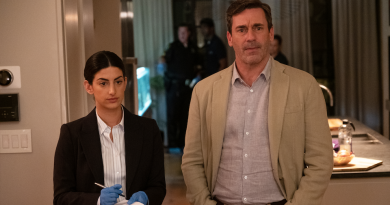Marjorie Prime (12A) | Close-Up Film Review

Dir: Michael Almereyda, US, 2017, 99 mins.
Cast: Jon Hamm, Geena Davis, Tim Robbins, Lois Smith
Review by George Meixner
This adaptation of the clever four-handed play by Jordan Harrison will leave you reflecting and wondering for days. It is a contemplation on the nature of memory in a world where the recently deceased can be resurrected as AI holograms.
Lois Smith, who has appeared on the stage in the same role, plays Marjorie – an elderly woman with failing memory – that in this near-future world is able to converse with her recently departed husband, Walter (Hamm). This is possible when her daughter and son-in-law, Tess and Jon (Davis and Robbins) move in to aid her and decide that purchasing this holographic technology might encourage her spirits and stimulate her little grey cells.
The ‘Primes’ as the hardware is referred to, imitate their ‘host’ and grow more realistic. As they gain knowledge from stories or being told about host behaviour, they become better tools to help humans with anything from grieving to memory loss. In effect, they provide self-psychotherapy. Marjorie’s conversations with her husband Walter (seen in his ‘prime’ as a handsome Jon Hamm) are informed by her son-in-law’s education of the hologram and then by correcting him and telling stories until ‘Walter’ can start feeding that information back to her in order to mimic natural conversation. But are they merely just parrots? The play and film clearly enact a Turing Test in the literal way Ex Machina also used practical conversation to determine a computer’s capacity to pass as human. Instead of Domnhall Gleason deciding if there’s a pass or fail, Marjorie Prime asks the audience to subtly think about this. The function of the technology here is much more of a dramatic device than the plot-driver it was in Alex Garland’s brutal sci-fi experiment.
It’s delightfully lean and precise, owing to its theatrical antecedence. This creates a rapt attention to detail as lines are learned and reused by human and computer alike. Upon second viewing it was also clear that what the flesh and blood characters told the Primes as part of their education reflects and projects much more about them than they intend. In this way relationships are tenderly and more honestly explored without two humans having to talk. It’s what humans tell a Prime and a Prime passes on that is so revealing.
The delicious final scene seems to test the technology beyond a point perhaps even the software engineers imagined. The Turing Test hits top gear and perhaps the cracks appear or perhaps something else is being hinted at. The film is a very true translation of the play, in a perverse way this tarnishes it as a repetition, but like any edifying source material – it’s fantastic that this play is being given wider exposure.

